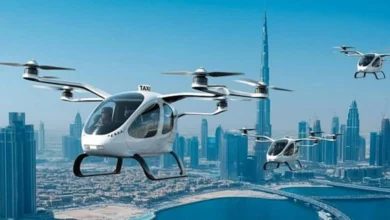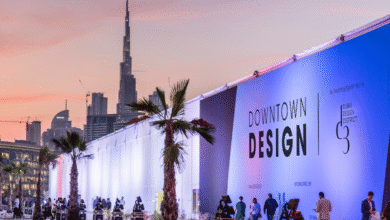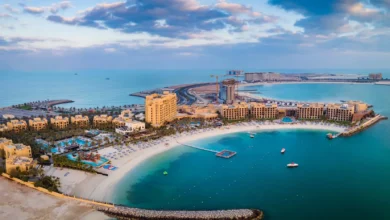
DEWA’s Warsan Project: A Global First in LEED Platinum Certification
In an era where sustainability and innovation intersect to redefine global standards, DEWA (Dubai Electricity and Water Authority) sets a new benchmark with its Warsan Project, marking a monumental stride towards sustainable development. This groundbreaking initiative not only showcases DEWA’s commitment to renewable energy and clean energy solutions but also positions it as a front-runner in achieving net-zero emissions in the multifamily housing sector. By securing a Global First in LEED Platinum certification, the Warsan Project underscores the importance of integrating smart services, digital transformation, and energy efficiency into the fabric of urban development, promoting a green economy and a sustainable future.
The article delves into DEWA’s leadership in sustainability, highlighting its innovative approaches to leveraging solar power, smart grids, and energy storage. It further explores the distinguishing features of LEED Platinum Projects that set Warsan Complex apart, such as its high standards for energy efficiency and sustainable building practices. Additionally, the influence of such a pioneering project on the multifamily housing sector is examined, showcasing how it serves as a model of sustainability and innovation. With a focus on sustainable development and renewable energy, the Warsan Project reflects DEWA’s unwavering dedication to advancing a sustainable future through smart services, clean energy, and a commitment to a smart, green economy.
DEWA’s Leadership in Sustainability
DEWA demonstrates a profound commitment to sustainability, aligning its operations with the Dubai Clean Energy Strategy 2050 and the Dubai Net Zero Carbon Emissions Strategy 2050. Their goal is ambitious: to provide 100% of energy production capacity from clean energy sources by 2050, supporting the 17 UN Sustainable Development Goals 2030.
DEWA’s Green Initiatives
DEWA has launched several groundbreaking projects at the Mohammed bin Rashid Al Maktoum Solar Park, including the pioneering Green Hydrogen project, the first in the MENA region to produce hydrogen using solar power. This initiative not only underscores DEWA’s innovative approach but also its role in shaping the future of energy. Furthermore, DEWA’s commitment extends to biodiversity through its collaboration with the Emirates Marine Environmental Group, organizing campaigns to clean beaches and plant mangroves, crucial for preserving marine ecosystems.
Vision for the Future
Looking ahead, DEWA is constructing the Al Shera’a headquarters, poised to be the tallest, largest, and smartest Zero Energy government building globally. This structure is designed to achieve a LEED Platinum rating, emphasizing DEWA’s leadership in sustainable building practices. Additionally, their ongoing projects, such as the hydroelectric power plant in Hatta and the extensive Shams Dubai initiative, reflect a steadfast dedication to enhancing sustainable energy solutions. These efforts are not only pivotal for environmental stewardship but also for positioning Dubai as a leader in the global green economy.
Features of LEED Platinum Projects
LEED, which stands for Leadership in Energy and Environmental Design, is globally recognized as the premier benchmark for green building. Projects aiming for LEED certification, especially at the Platinum level, must meet stringent criteria across multiple categories, including energy efficiency, indoor air quality, and the use of sustainable materials.
Standards and Requirements
To achieve LEED Platinum status, projects must accumulate over 80 points in a rating system that assesses everything from water metering to greenhouse gas emissions and maintenance costs. Key areas evaluated include the utilization of resources, the operation costs, and the environmental impact of the materials used. Projects must also meet prerequisites in energy performance and education about sustainable practices for building managers.
Global Examples
LEED Platinum certified buildings are known to command higher rental rates—up to 20% more compared to non-certified buildings, with notably lower vacancy rates. These buildings also report better retention rates, increased occupant satisfaction, and enhanced productivity, which are critical factors contributing to their financial performance. The comprehensive approach to sustainable building not only supports environmental goals but also boosts economic benefits, making LEED Platinum a sought-after standard in global construction and design.
Warsan Complex Highlights
The Dubai Electricity and Water Authority (DEWA) residential complex in Warsan stands as the first diversified family housing project globally to achieve the Platinum Leadership in Energy and Environmental Design (LEED) rating. This prestigious recognition was awarded by the US Green Building Council (USGBC), marking it as the first mixed-use family housing project worldwide to receive this international certification with a score of 80 points in the LEED v4.1 system.
Unique Architectural Design
The Warsan residential complex comprises a family housing building and a bachelor housing building, both designed with sustainability at their core. The complex achieved significant reductions in resource use, boasting 61 percent water savings and 28 percent energy savings compared to standard buildings. Additionally, the complex produces 10 percent of its energy requirements from renewable sources, further reducing its environmental footprint.
Community and Lifestyle Benefits
The design of the Warsan complex prioritizes the well-being and satisfaction of its residents. The use of low-VOC materials in the complex’s furniture enhances the indoor environmental quality, contributing to healthier living conditions. This furniture is certified by the Forest Stewardship Council (FSC), ensuring that it comes from responsibly managed forests that provide environmental, social, and economic benefits.
Influence on the Multifamily Housing Sector
Warsan 4, a sub-community of Al Warsan in Dubai, is setting remarkable benchmarks for multifamily housing sectors globally. It offers a diverse range of residential properties, including apartments and townhouses, which cater to a wide demographic. The community is designed with a focus on affordability and sustainability, making it an attractive option for both residents and investors.
Setting New Standards
Warsan 4 is not just a residential area but a pioneering example of sustainable living. With developments like the Warsan Complex achieving a LEED Platinum rating, the community sets new standards in environmental responsibility and energy efficiency. These standards are likely to influence future developments, encouraging them to integrate similar sustainable practices.
Policy and Regulation Changes
The success of Warsan 4 in implementing sustainable and affordable housing solutions may prompt policy and regulation changes in the multifamily housing sector. By demonstrating the economic and environmental benefits of such developments, it could lead to more stringent sustainability requirements and incentives for green building practices in other regions. This shift is essential for promoting long-term sustainability in urban planning and development.
Reflecting on the remarkable achievements of DEWA’s Warsan Project, it’s evident that this initiative sets a new global benchmark for sustainability and innovation within the multifamily housing sector. By embracing renewable energy, prioritizing energy efficiency, and achieving the prestigious LEED Platinum certification, the project not only showcases DEWA’s leadership in sustainable development but also represents a significant leap toward achieving net-zero emissions in urban housing. The insightful exploration of the project’s innovative approaches, from leveraging solar power to integrating smart services, underscores its role as a model for future developments aiming for sustainability and energy efficiency.
The broader implications of the Warsan Project extend beyond immediate environmental benefits, heralding a transformative impact on the multifamily housing sector and potentially influencing policy and regulation changes towards green building practices globally. As such, the project stands as a testament to the power of visionary leadership and strategic investment in sustainable infrastructure, challenging communities worldwide to consider the long-term benefits of sustainable living. Emphasizing the importance of collaboration, innovation, and commitment, the Warsan Project paves the way for a greener, more sustainable future, encouraging further research and action in sustainable urban development.







[…] Eight-times platinum certification for his debut single […]
[…] has adopted a detailed approach to environmental stewardship that marks a revolutionary chapter in global climate action through its participation at […]